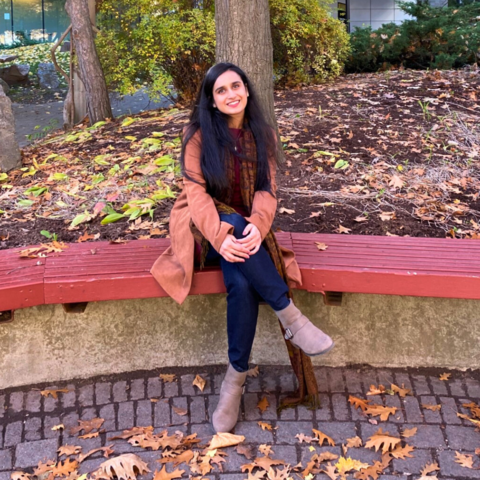Science that matters: Master’s student investigates a drug’s therapeutic potential for improving autophagy in Huntington disease
Proteins are integral parts of our cells that maintain cell function. They can undergo modifications which make them more specialized and better suited for specific tasks.
By Alyana Versolatto
Graduate Recruitment Officer
This includes the addition of small molecules such as sugars and lipids to help customize proteins so they can perform their roles effectively. Proper protein location within the cell is crucial for their roles, but misplacement (called protein mislocalization) can impede functions, affecting cell operation.
Fatima Abrar’s research focuses on how protein mislocalization affects autophagy in Huntington disease (HD). Autophagy is the process of removing and recycling old and damaged cell parts—you can think of it as quality control for cells. It is an essential process that helps maintain cellular health and optimizes cell performance by removing toxic and non-functional parts in the cell. HD is a genetic neurodegenerative disorder that affects neurons in the brain. A defect in the cargo-loading stage of autophagy of a person with HD contributes to the accumulation of toxic proteins that eventually cause cell death. The disease leads to brain changes that cause abnormal involuntary movements, a severe decline in thinking and reasoning skills and mood changes. Patients with HD die 10-20 years after the onset of symptoms.
Sequestosome 1 (SQSTM1) or p62 is an important protein that regulates autophagy. During her research as a Master of Science in Biology student, Abrar characterized how modifying the lipidation of p62 (a process of adding lipids onto the proteins) may rescue the autophagy defect in HD. For this purpose, she investigated the therapeutic potential of a drug that may improve autophagy and promote the clearance of toxic proteins and aggregates. Her work and any future studies are paving the way for the development of drugs and molecules to target pathways to potentially treat diseases that have protein mislocalization as a hallmark for pathogenesis.
Abrar graduates from her master's program this spring and plans on pursuing a PhD in the future because she loves research and is passionate about deepening her understanding of the molecular mechanisms involved in protein clearance pathways.
What drew you to studying in the Master of Science (MSc) in Biology program at Waterloo? What has your experience been like?
During co-op work terms in my undergraduate studies in biochemistry at Waterloo, I discovered my interest in research. My interest was strengthened when I completed my undergraduate thesis project in the NeurdyPhagy Lab with Dr. Dale Martin, within the Department of Biology. The research in the lab focused on discovering and understanding molecular mechanisms that promote the clearance of disease-causing proteins in neurodegeneration. Their mission aligned with my research goals and prompted me to apply for a master’s position in the lab.
Additionally, Waterloo is an institution that values ideas and innovation and that appealed to me. Overall, my time in the master’s program has been transformative, and has equipped me with the tools and knowledge needed to make meaningful contributions to the field of biology.
What was the working relationship like with your supervisor, Dr. Martin?
Working with Dr. Martin has been exceptionally positive as he is a very supportive and understanding supervisor. He is an excellent mentor who provides invaluable insights, constructive feedback, and constant encouragement, which were all integral in shaping my research. Dr. Martin’s approachability and willingness to provide guidance, advice, and mentorship greatly contributed to my professional growth and development.
How did you spend your time outside of your studies? What did you enjoy about living in Waterloo Region?
My activities change with my mood on any given day—whether I hang out with family or friends or just enjoy a cup of coffee while watching a movie. It’s important to take mental breaks from studying and research, and I find comfort in peaceful surroundings. Luckily, there are several peaceful spots near campus like Columbia Lake where I like to go for walks and enjoy the nice weather.

Fatima Abrar (she/her)
Master of Science (MSc) in Biology student